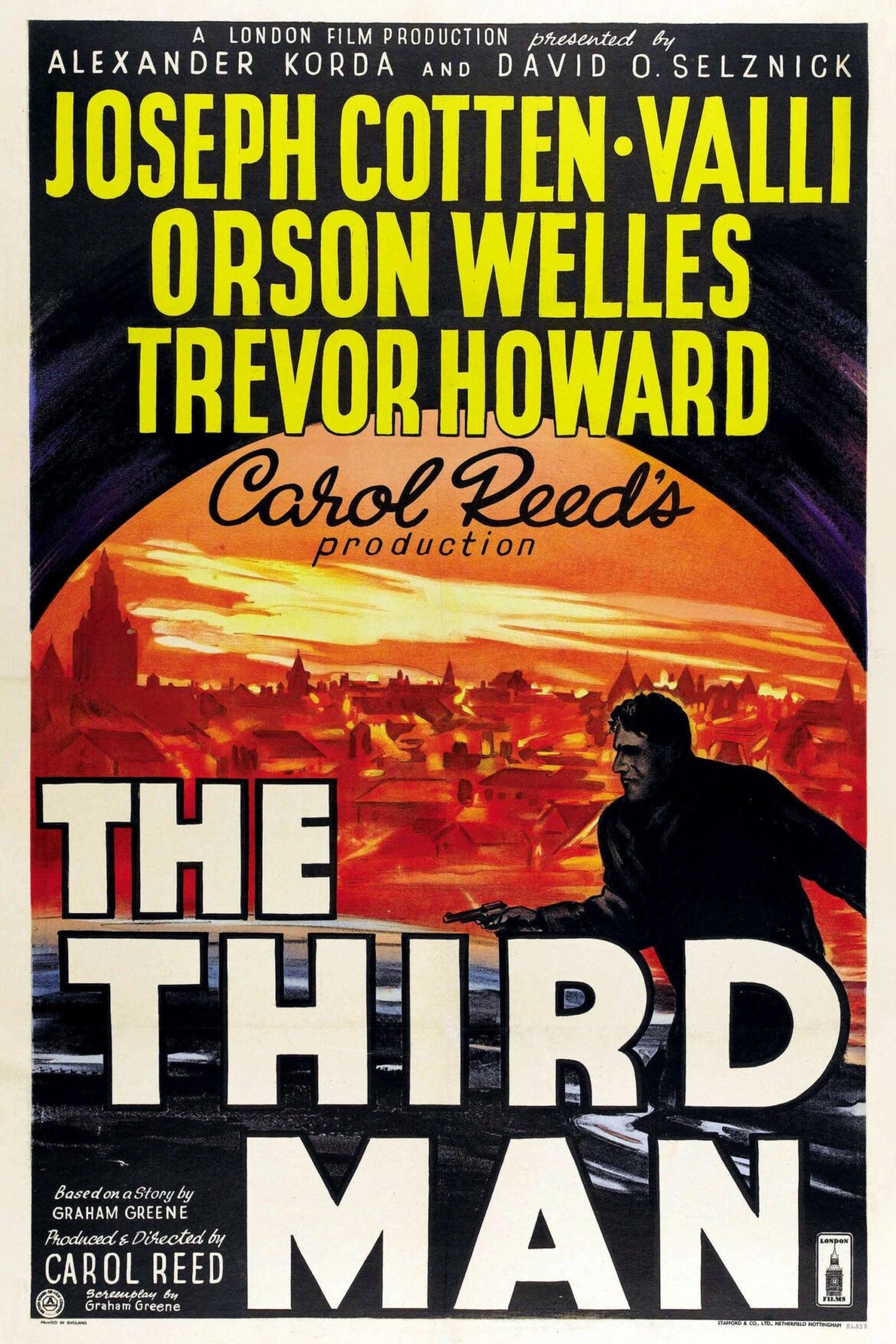The Third Man (1949) – A Classic Noir with Unforgettable Suspense
Type: Movie
Country: United Kingdom
Genre: Film Noir
Release Date: September 2, 1949
Duration: 104 minutes
Director: Carol Reed
Production Companies: London Film Productions, ORTF
Cast: Joseph Cotten, Alida Valli, Orson Welles, Trevor Howard, Bernard Lee
Quick Review:
“The Third Man” (1949), directed by Carol Reed, is a quintessential film noir that stands out for its intricate plot, atmospheric cinematography, and unforgettable performances. Set in post-war Vienna, the film masterfully combines suspense, mystery, and dramatic tension, anchored by Orson Welles’ charismatic portrayal of the enigmatic Harry Lime. With its distinctive visual style and haunting score, “The Third Man” remains an enduring classic in the genre.
Plot Summary:
The film unfolds in a ravaged post-war Vienna divided among the Allies. Holly Martins (Joseph Cotten), an American writer of pulp westerns, arrives in the city to visit his old friend, Harry Lime. Upon arrival, Martins discovers that Lime has recently died under suspicious circumstances. As he delves into Lime’s life, Martins uncovers a web of deception involving racketeering and a sinister black-market operation. The search for truth reveals shocking secrets and leads to a dramatic confrontation, all against the backdrop of a city struggling to recover from the war.
Characters and Performances:
- Joseph Cotten (Holly Martins): Cotten delivers a compelling performance as Holly Martins, a writer who becomes entangled in a dangerous conspiracy. His portrayal captures Martins’ transition from naïve visitor to determined investigator.
- Alida Valli (Anna Schmidt): Valli plays Anna Schmidt, a struggling actress and former lover of Harry Lime. Her performance is marked by emotional depth, reflecting her conflicted feelings about Lime and her own survival.
- Orson Welles (Harry Lime): Welles portrays Harry Lime, the film’s enigmatic and morally ambiguous anti-hero. His charismatic and enigmatic performance is central to the film’s allure, with a memorable entrance and a climactic revelation that underscores his complex character.
- Trevor Howard (Major Calloway): Howard plays Major Calloway, a British officer investigating Lime’s activities. His role adds a layer of authority and procedural insight to the story.
- Bernard Lee (Sergeant Paine): Lee’s portrayal of Sergeant Paine complements the film’s noir atmosphere with his grounded, authoritative presence.
Direction and Cinematography:
Carol Reed’s direction of “The Third Man” is exemplary, showcasing his ability to create tension and suspense through meticulous storytelling and pacing. The film’s cinematography, by Robert Krasker, is iconic, employing high-contrast lighting and innovative angles to evoke the film’s dark, atmospheric tone. The use of Vienna’s war-torn streets and shadowy alleyways adds to the film’s haunting quality and visual impact, making the city itself a character in the narrative.
Music:
The film’s music, composed by Anton Karas, features the distinctive zither score that has become synonymous with “The Third Man.” Karas’ composition creates a unique blend of melancholy and suspense, enhancing the film’s atmosphere and contributing to its enduring legacy.
Why It Endures:
“The Third Man” endures as a classic due to its masterful combination of suspense, visual innovation, and memorable performances. Its exploration of post-war disillusionment, coupled with a gripping narrative and striking cinematography, solidifies its status as a seminal work in the film noir genre. The film’s unique score and atmospheric setting further contribute to its lasting appeal.
In Conclusion:
“The Third Man” (1949) remains a towering achievement in film noir, celebrated for its intricate plot, atmospheric cinematography, and exceptional performances. Directed by Carol Reed and featuring a standout performance by Orson Welles, the film captivates with its suspenseful storytelling and unforgettable visual style. As a reflection of post-war Vienna and a study of moral ambiguity, “The Third Man” continues to be a definitive example of classic cinema.


